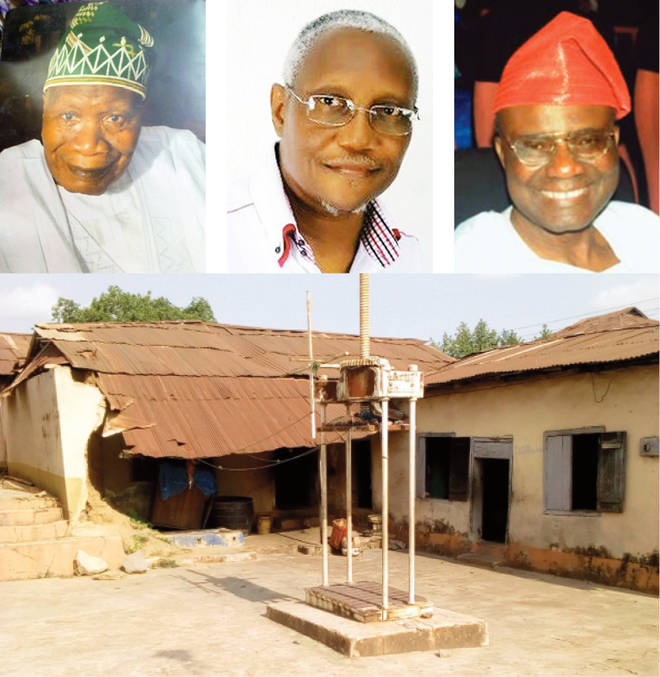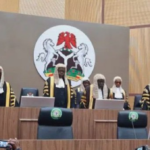
The story of the Majekodunmi family of Abeokuta, Ogun State, is that of mixed feelings, particularly after learning of the genesis of the name Majekodunmi.
Looking back at the ancestral family house tucked inside the rubble of the old buildings at Ikereku area of Abeokuta, in Abeokuta North Local Government Area, one cannot but be inspired by the calibre of men and women the Majekodunmi progenitor, late Chief Oyeneye Bankole Majekodunmi, had produced.
With 29 wives, 28 children comprising 16 males and 12 females including two adopted children, Majekodunmi’s name according to his prophesy “will continue to ring bell hundreds of years to come.”
The story of the birth of Oyeneye Majekodunmi according to Alhaji Razak Majekodunmi, who spoke with our correspondent at the “Jubilee House” of the Majekodunmis, Ikereku on Wednesday, is shrouded in mystery.
“His father had a history of deaths at birth of his children. So, when Oyeneye was born around 1800, he was given no chance to survive, particularly as the strange illness started again.
“With no hope, he was thrown into a bush to die but by divine intervention, an Ifa priest who was out early in the morning heard the cry of the baby and picked him up from the bush. He took the baby to the father and encouraged him to take care of him. He told him not to allow the agony of losing him one day force him to abandon the baby to die in the bush (Majekodun e) because he would be famous and powerful in this world.
“True to this prophesy, the rest is now history. The father later changed his name to Majekodunmi.”
Another story recorded that the name Majekodunmi came as a result of a mishap. One day, a horse ridden by his master slave accidentally trampled on and killed his adopted stepdaughter (daughter of his Dahomean wife) and Oyeneye swore that the slave must die.
“When the news got to town, all other Baloguns and prominent people in Abeokuta came to beg for the slave’s life, saying, “ma je ko dun e (don’t let it hurt you).
“After many entreaties, Pa Oyeneye finally agreed to spare the slave’s life but said henceforth, his name would become Oyeneye Majekodunmi, because he was moved by their pleadings and entreaties,” a document produced by the family during the 126th anniversary of his death in January 2010 was quoted as saying.
Whichever a story is true, the fact remains that during his reign, he was so popular that not many remembered the family background of Oyeneye.
According to Alhaji Razak, the story of Majekodunmi’s roots started from Oko under Oyo Empire, when his father Bankole migrated to Ibadan during the war. His brother came to join him in Ibadan and he again moved to this place in Abeokuta with his mother around 1830s.
Oyeneye’s mother was a princess, the daughter of the reigning Alafin of Oyo. He was very brave and successfully led the Egba Army into many battles. His exploits in battle were so remarkable that his colleagues in the War Council nicknamed him ‘Kiniun Egba’, meaning the Lion of Egba.
“On one occasion, when he returned alongside other Baloguns from a successful expedition, he was personally greeted by Oba Olufemi, the then reigning Alake of Abeokuta (1854-1862).
“After warm greetings, the Alake congratulated the Balogun of Ikereku for a job well done and requested him to continue to defend the Egbas in battle so that they would never be shamed, saying in Yoruba, ‘ma je k’oju ti Egba’, a promise Oyeneye kept until his death on January 26, 1884.
Majekodunmi was not only a warrior, but also a farmer, slave merchant and a successful trader.
Despite his large family, discipline was the key word according to Alhaji Razak. “My father was the second among his children and the message has always been ‘remember whose child you are’. My father had no blemish and so it must go down from generation to generation.
“We are known all over the world. I’m sure your office realized that hence your coming here.”
Among those the Oyeneye Majekodunmi lineage had produced is the late Chief Dr. Moses Majekodunmi, the former administrator of the South West region and founder of the popular St. Nicholas Hospital Lagos.
There is also the late Pa Majekodunmi, a former and first Registrar, Federal College of Education (FCE) Osiele Abeokuta.
A member of the Governing Council of the National Institute of Strategic Studies, Kuru, Dr. Femi Majekodunmi said it was a pride and honour to be a descendant of Oyeneye Majekodunmi.
“It is a name we are all proud of. We are noted for dexterity in business, education and most of all discipline,” the medical practitioner told our correspondent.
On the spiritual front, Alhaji Majekodunmi said his father, Ladipo, told him that Oyeneye was a pagan, “but Islam came before Christianity and my grandfather gave his children the privilege to choose a religion, and that was how some became Muslims and others Christians.”
At the Jubilee House, Alhaji Razak Majekodunmi’s son, Alfa Akeem, who took the correspondent round, said the integrity of the name was still intact. Akeem, a great-grandchild said, “That name is a guide for all to remain obedient and disciplined.”
Evidence of his trade exploits is the relics of the cotton milling machine which still stands in the middle of the renovated compound, which according to Akeem “serves as the meeting venue for all Majekodunmi’s descendants.”



